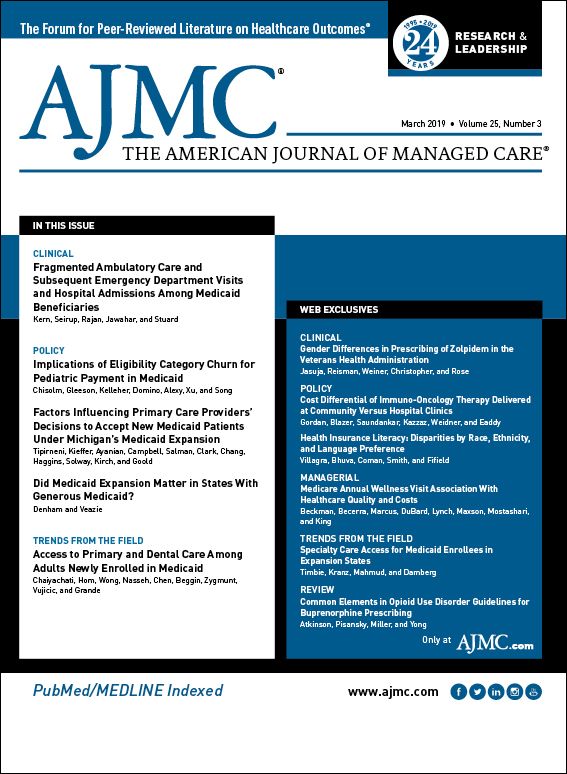- Center on Health Equity & Access
- Clinical
- Health Care Cost
- Health Care Delivery
- Insurance
- Policy
- Technology
- Value-Based Care
From the Editorial Board: Austin Frakt, PhD
The Affordable Care Act Medicaid expansion is popular. That’s true even in the 14 states that haven’t yet expanded their programs. According to the Kaiser Family Foundation, in those states, 77% of people view Medicaid expansion favorably and nearly 60% would like to see their state adopt it.1 Despite its popular support, expansion has not occurred in these states precisely because it is controversial among policy makers.
Yet, Medicaid offers many benefits. The most direct benefit is enhanced access to care through reduction in financial barriers. For example, Cole et al2 found that after Medicaid expansion, patients at community health centers were 12 percentage points less likely to be uninsured. The study also found no degradation in quality of care and, by some measures, improved quality. A systematic review of studies of Medicaid expansion by Mazurenko et al3 found that it was associated with increases in coverage and use of care and its quality. And the Oregon Medicaid study4 found increased use of some preventive care, improvements in financial well-being, and mental health benefits.
Politics and popularity aside—and despite its many benefits5—Medicaid does not address all healthcare access issues. In this issue of The American Journal of Managed Care®, for example, Chaiyachati et al found that one-third of new Medicaid enrollees in Philadelphia lacked a usual source of primary care. More than half lacked a usual source of dental care. In a study of Michigan primary care providers, Tipirneni et al found that acceptance of Medicaid patients hinged on practice capacity, specialist availability, and the physical and mental health needs of Medicaid patients. And Timbie et al documented challenges in access to specialty care for patients seen at community health centers in 9 states and the District of Columbia.
Medicaid also does not address the issues associated with fragmented care, which is the norm in the US health system. Also in this issue, Kern et al found that care fragmentation among Medicaid patients increased the hazard of emergency department visits.
Finally, as Denham and Veazie found, some states with generous pre-expansion eligibility levels have seen enrollment growth after expansion. This suggests that simplified enrollment processes and increased awareness may boost enrollment independent of eligibility. Yet, this too does nothing to address the other access and care fragmentation issues that pervade the US health system.
In total, studies in this issue demonstrate that if and when states expand Medicaid, many familiar issues remain, even as Medicaid provides myriad benefits. The remaining issues include access to care and care fragmentation. As policy makers in states that have not yet expanded gradually opt to do so, they can be confident that they are appealing to popular sentiment and that they are expanding coverage that will lead to increased healthcare use and benefits to health and well-being (including financial well-being). However, they should expect many of the familiar issues with the US health system to remain.REFERENCES
1. Kirzinger A, Wu B, Brodie M. KFF Health Tracking Poll — November 2018: priorities for new Congress and the future of the ACA and Medicaid expansion. Kaiser Family Foundation website. kff.org/health-reform/poll-finding/kff-health-tracking-poll-november-2018-priorities-congress-future-aca-medicaid-expansion. Published November 28, 2018. Accessed February 25, 2019.
2. Cole MB, Wright B, Wilson IB, Galárraga O, Trivedi AN. Medicaid expansion and community health centers: care quality and service use increased for rural patients. Health Aff (Millwood). 2018;37(6):900-907. doi: 10.1377/hlthaff.2017.1542.
3. Mazurenko O, Balio CP, Agarwal R, Carroll AE, Menachemi N. The effects of Medicaid expansion under the ACA: a systematic review. Health Aff (Millwood). 2018;37(6):944-950. doi: 10.1377/hlthaff.2017.1491.
4. Baicker K, Taubman SL, Allen HL, et al; Oregon Health Study Group. The Oregon experiment—effects of Medicaid on clinical outcomes. N Engl J Med. 2013;368(18):1713-1722. doi: 10.1056/NEJMsa1212321.
5. Carroll AE. Finally, some answers on the effects of Medicaid expansion. The New York Times. July 2, 2018. nytimes.com/2018/07/02/upshot/finally-some-answers-on-the-effects-of-medicaid-expansion.html. Accessed February 25, 2019.


